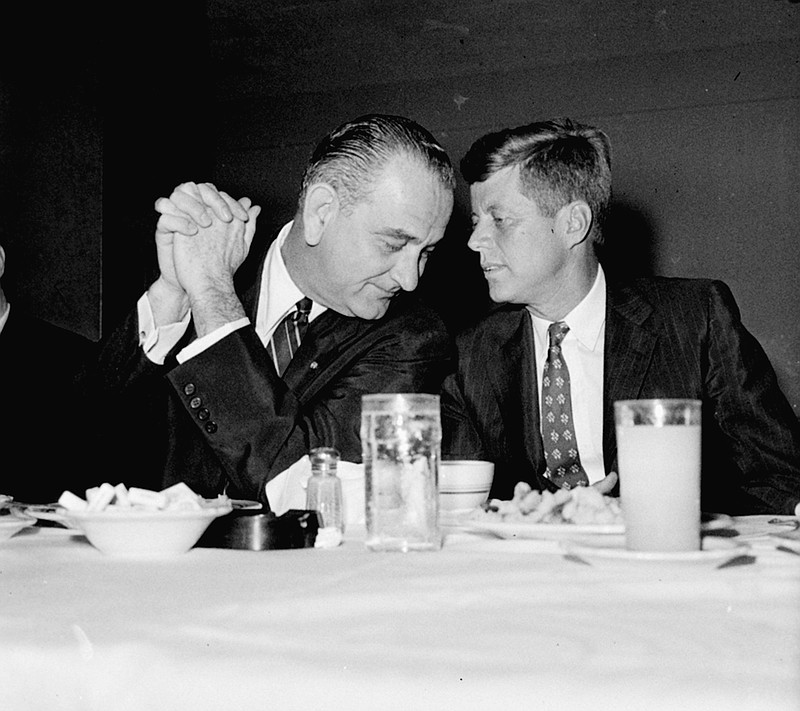The account describes the president as "morose, self pitying, angry ... tormented." Another impression of him says he tended to "display many emotions, ranging from anger, to humor, to unpredictability."
Whether or not his emotions were "abnormal," says the man giving the second chronicle, was "very debatable." However, he was not willing to go so far as to say the president's actions were "outside the normal range."
Of course, many - mostly privately - had described the president's demeanor and actions as "abnormal" and "outside the normal range" for years, well before the presidency. They'd seen it in his dealings with people, especially those beneath him and with those he felt owed him something.
The sagas of his episodes with women were also known to many, though more privately than publicly. But some of those had begun to creep into the knowledge of those who were to report on him daily.
"What I experienced nearly every time I saw him was a squeeze on the butt," one woman said, "or putting his arm around my wrist and pulling me to the side. These were definitely sexual expressions, but he wasn't trying to take the next step. ..."
In fact, the president told reporters, assuming they would never reveal it, they should take no notice of "me coming in and out of a few women's bedrooms while I am in the White House. ... That is none of your business."
Shockingly, one aide even observed him - away from the executive mansion and on his own property - driving with one hand and using the other to go "under the ... skirt" of a woman sitting between him and the first lady.
The president, some say, described himself with a "sexual gorilla" image and was known to allude to intimate relations with his wife.
His proclivities even entered his hiring desires. Officials were instructed to employ women with "good behinds" so he could "enjoy" their look as they left the room. And he warned one hire: "If you wear a tight dress like that, you are going to get your bottom pinched."
Having seen and heard a lot, one aide wondered aloud if the "philosophical acceptance" by the first lady of the president's behavior with women would ever have been tolerated by the wife of a former president, who had had a similar sexual appetite.
Beyond his various emotions and sexual habits, his off-color stories, his graphic descriptions and his salty language also were no secret.
Still, as the months went by, with the president's volatile moods, those around him wondered how he'd be able to deal with the increasingly difficult decisions and frustrations that would inevitably crop up as he dealt with Congress and continuing problems abroad.
Yet, Lyndon Johnson, whose aforementioned actions were described in the 2015 book "Lady Bird and Lyndon" by Betty Boyd Caroli, finished his term as president in 1969 and remains to liberals a giant among chief executives.
Indeed, an effusive editor wrote in 2015, "just about anything you might feel thankful for in this country is because of Lyndon Johnson."
With the decidedly mixed success of his Great Society programs and the country's bogged-down war in Vietnam, though, Johnson's place among presidents will long be debated by historians.
But the current 45th president, whose exploits can sound a lot like those of the 36th president, gets no such pass.
In recent weeks, several Democratic U.S. lawmakers, in all seriousness, have contacted a Yale psychiatry professor to discuss President Donald Trump's mental state, according to Newsweek.
The professor, Bandy Lee, has written a book, "The Dangerous Case of Donald Trump," in which 27 psychiatrists, psychologists and mental health experts assess the president's state of mind.
Meanwhile, U.S. Rep. Jackie Speier, D-Calif., tweeted in August, "POTUS [president of the United States) is showing signs of erratic behavior and mental instability that place the country in grave danger. Time to invoke the 25th Amendment" [under which the president can be replaced because he is judged unable to perform his duties].
The professor from whom the California representative sought advice, John Gartner, a former professor at Johns Hopkins medical school, has written that "Trump is a profoundly evil man exhibiting malignant narcissism," adding that "history will not be kind to a [psychiatric] profession that aided in the rise of an American Hitler through its silence."
Any politician, professional or pundit who describes the president as "an American Hitler" can easily be judged nonserious.
Nevertheless, the presidency, now more than ever, is conducted in a fishbowl. The largely private behavior of Johnson is often on daily public display from Trump. The change in how it's viewed doesn't excuse the poor habits of either president and requires all of us to remain observant, but it doesn't mean life can't go on.
Fortunately or unfortunately, we just have a broader window through which to view it.
